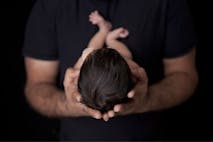
New Archbishop of Canterbury warns of danger in legalizing assisted suicide
Nancy Flanders
·
Response to pro-choice blogger: you’re begging the question
Somebody emailed me this blog post by someone who goes by the name “uncloseyourmind.” I want to offer a brief response to get him or her thinking more about the issue.
Common Ground
Here’s where we agree: uncloseyourmind opens the post by saying we need to talk about abortion. I whole-heartedly agree. Lots of people don’t want to talk about this, but whether pro-life or pro-choice people are right, this issue is an important one. If pro-choice people are right, then people like me want a medical procedure that’s tantamount to having a mole removed to become illegal. If pro-life people are right, then around 3,300 human beings will be wrongfully killed in America today. (Based on Guttmacher stats.) Either way it’s an important issue worth talking and thinking carefully about.
We also agree that women are persons, although we have a different definition of personhood. The word “person” is not preferable to me to describe anybody, because the word “person” is a legal term that’s been used in history to discriminate against different communities of human beings. I prefer to just say “human being,” because I believe all human beings are intrinsically valuable. I don’t know how you make sense of the concept of “equal human rights” without believing that humans have inherent value.
Personhood Criteria
Uncloseyourmind asserts that a person can be identified by asking these four questions:
1. Can the entity act in the world and respond to its environment?
2. Is the entity aware of its own existence?
3. Does the entity possess rights and duties?
4. If it can claim the right to live, does it live independently?
Obviously an unborn child, at least in the first trimester, doesn’t qualify under those standards as a person, except for arguably the first question. An embryo responds to its environment from fertilization.
The third question is actually a perfect example of circular reasoning, as the question at play is whether the unborn has rights. In other words, the implicit argument goes like this: “Does the unborn have rights? That depends on 4 questions, one of which is whether the unborn has rights.” Circular reasoning.
The problem here is that I have no reason to believe that the other qualities, (responding to the world, self-awareness and independence/viability) are morally relevant to determining a human being’s value. Maybe they are morally relevant, but there is no argument made that these are the relevant questions to be asking. They’re merely asserted, and then the blogger argues why the unborn don’t qualify under those asserted qualifications. That’s skipping a step, and it undermines the entire article. It undermines the entire article because every main point the blogger makes during the rest of the article assumes the unborn aren’t “persons,” and because that was never argued for, it’s classic begging the question.
Allow me to illustrate with the blogger’s next point.
“When abortion is illegal, women are not safe.”
For sake of argument, let’s assume that uncloseyourmind is correct and women around the world will continue to ignore abortion laws when they don’t agree with them and pay for risky, illegal abortions. This is only a morally relevant point if the unborn are not full human beings like the mother is. If the unborn are not human, then I agree, we should make abortions as safe as possible, because the only human being in the equation (besides the abortionist) is the mother. If the unborn are human, then the safety of killing that human is not the topic we should be focused on.
As Scott Klusendorf says, “why should the law be faulted for making it more risky to kill innocent human beings?”
You can see that the blogger is begging the question by bringing up the danger of illegal abortions without having first argued that the unborn are not “persons.”
“Not all women who get pregnant can have safe pregnancies.”
This is an example of a different informal logical fallacy: a strawman argument. Virtually no pro-life people or organizations, including the Catholic Church, are arguing that abortions to save the mother’s life should be illegal. (A distinction is sometimes made that a life-saving procedure that saves the mother’s life but results in the death of the embryo is not an “abortion,” but a life-saving medical procedure.) Whatever you call it, these procedures weren’t illegal before Roe, and they wouldn’t be illegal after Roe. That’s because if the mother’s life is at risk and the only way to save her life is to end the pregnancy, then it’s morally permissible. You can get there by using double effect reasoning, or you can use the philosophical concept of “third-party defense against an innocent aggressor.” (Similar to self-defense.) It doesn’t mean I think the unborn is not human in the case that the mother’s life is in danger. It means that through careful philosophic reasoning we can make sense of the idea that it’s morally permissible to take action to save a mother’s life, for instance in the case of a tubal pregnancy, even if we have the foreknowledge that the human embryo will not survive the surgery. Any careful thinker can differentiate between a salpingectomy and an elective abortion.
“An accidental pregnancy or a rape can destroy a woman’s life if she does not have access to abortion.”
I agree that pregnancy can be very difficult for a woman where the circumstances of conception involve rape. I’ve talked to enough rape-victims that became pregnant and gave birth to their baby that I’m a little weary of agreeing that this can “destroy a woman’s life.” That seems to assume a certain fragility about women that feels a little misogynistic to me, but that doesn’t mean I think pregnancy is easy, under any circumstances.
I also don’t think rapists are punished enough in our society. They’re often not even prosecuted for their crime, and when they are, they get off with too light of a prison sentence (in many states.) I say lock them up and throw away the key, because rape is one of the most evil and inhumane acts a human being can do to another human being.
But my colleague Steve Wagner asks a fair question here: “why should the child pay with her life for her father’s crime? The answer is yes if she’s not a child, but just a blob of cells or “potential human,” but that question has not been answered here.
Another relevant question from Scott Klusendorf would be this: how should our society treat people who remind us of a painful event? If the entity in question is a human being like you and me, then the answer is certainly not to kill him or her. I think the answer is to punish the criminal to the fullest extent of the law so that justice can be done, and to pass legislation for stronger punishments for those criminals. Legislation like that would recognize the true horror that is rape, and I think our society would be better for it.
Conclusion
Perhaps this blogger is right in that abortion should remain legal, but he or she has not actually argued for that position. He or she has simply asserted a very high bar that disqualifies the unborn from personhood as well as many other humans, including newborns and those that are disabled, and then argued from there. That is explained really well in a comment that was posted under the bloggers article, by an atheist who refers to himself as “G.F.”
Read every word:
I don’t see how whether a child is a product of rape or not has anything to do with whether or not it should be aborted. From the perspective of someone who believes in rights for the unborn, the actions of its father are irrelevant. If your father went and raped someone, it would be ridiculous to advocate punishing you for his crime. Similarly, a child that is the product of rape should not be killed because it’s father is a rapist.
As for “what qualifies as a person” in this article, you seem to set a very high standard for “personhood”.
People who are incarcerated or severely disabled may lack the ability to interact with their world – a prisoner is stuck behind four walls; a quadriplegic cannot eat, bathe, use the bathroom, etc. without assistance.
Some people who are severely mentally disabled may also be “unaware of their existence”. At the very least, it would be difficult to assess whether they are or not.
The severely handicapped also do not have any duties in society – for criminal actions, they can be ruled not criminally responsible due to mental defect. Are they not entitled to rights and protections? Should the disabled be euthanised?
The fourth point is once again one of “living independently”, something that the severely mentally or physically disabled, as well as young children, are incapable of doing.
By your measure, many living, breathing human beings are not “persons”.
What I am suggesting is not a slippery slope fallacy – some abortion advocates ARE advocating infanticide.
http://www.bioedge.org/index.php/bioethics/bioethics_article/9950
http://jme.bmj.com/content/early/2012/02/22/medethics-2011-100411.abstract
As an atheist and free-thinker, it I am appalled by the all-too-commonplace belief among atheists that human life, particularly for the most vulnerable members of society, has no value. The argument of many religious people that atheists are amoral is, unfortunately, often correct.
Live Action News is pro-life news and commentary from a pro-life perspective.
Contact editor@liveaction.org for questions, corrections, or if you are seeking permission to reprint any Live Action News content.
Guest Articles: To submit a guest article to Live Action News, email editor@liveaction.org with an attached Word document of 800-1000 words. Please also attach any photos relevant to your submission if applicable. If your submission is accepted for publication, you will be notified within three weeks. Guest articles are not compensated (see our Open License Agreement). Thank you for your interest in Live Action News!

Nancy Flanders
·
Analysis
Cassy Cooke
·
Analysis
Nancy Flanders
·
Newsbreak
Angeline Tan
·
Human Interest
Nancy Flanders
·
Issues
Nancy Flanders
·
Issues
Josh Brahm
·
Human Rights
Josh Brahm
·
Issues
Josh Brahm
·
Analysis
Josh Brahm
·
Opinion
Josh Brahm
·